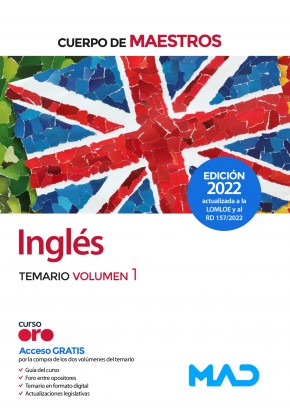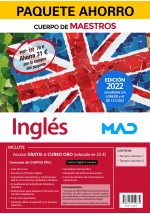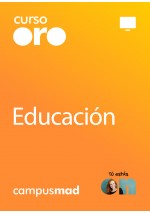
 Fracciona tu pago desde 3 meses sin intereses por compras superiores a 120€
Fracciona tu pago desde 3 meses sin intereses por compras superiores a 120€
Cuerpo de Maestros. Inglés

Ahorra 31€ + 5% descuento online (incluye en papel: Temario volúmenes 1 y 2; y acceso online gratis a Curso Oro)
97,20 €
66,50 €
| ¿Qué incluye? | |
| 12 Temas | Actualizado con novedades legislativas |
| GRATIS Curso Oro* | Recursos didácticos |
* Consulta los libros necesarios para acceder GRATIS al Curso Oro.
| Descripción | add clear |
Editorial MAD y Trivium Centro de Oposiciones de Murcia le ofrecen una nueva edición actualizada del temario de Inglés para el acceso al cuerpo de Maestros según el programa oficial vigente.
Este volumen incluye los 12 primeros temas, elaborados teniendo en cuenta la Ley Orgánica 3/2020, de 29 de diciembre, por la que se modifica la Ley Orgánica 2/2006, de 3 de mayo, de Educación (LOMLOE) y el Real Decreto 157/2022, de 1 de marzo, por el que se establecen la ordenación y las enseñanzas mínimas de la Educación Primaria.
Los temas responden fielmente a los epígrafes e incluyen índice, introducción, conclusión, resumen y bibliografía especializada. Todos ellos se han redactado con profundidad y rigor para asegurar una preparación eficaz y completa. En esta ocasión se han incorporado recursos didácticos y enlaces a través de códigos QR a páginas de interés y vídeos ilustrativos que le ayudarán a ampliar y fijar unos contenidos que, aunque vigentes desde el año 1993, han sido adecuadamente actualizados.
| Índice | add clear |
Topic 1. Language as communication: oral and written language. Factors that define a communicative situation: sender, receiver, functionality and context.
Topic 2. Communication in the foreign language classroom: verbal and nonverbal communication. Extralinguistic strategies: nonverbal reactions to messages in different contexts.
Topic 3. The development of linguistic skills: oral comprehension and expression, written comprehension and expression. Communicative competence in English.
Topic 4. Valuing the knowledge of foreign languages as a means of communication among people and nations/peoples. Interest in linguistic diversity through the knowledge of a new language and its culture.
Topic 5. Geographical, historical and cultural features of the English-speaking countries. Teaching the most relevant geographical, historical and cultural aspects.
Topic 6. Contribution of linguistics to foreign language teaching. The process of language learning: similarities and differences between first and second language acquisition.
Topic 7. Oral communication in the foreign language. The complexity of understanding the gist in oral interaction: from passive to active, selective listening. Learning to speak: from imitative reproduction to autonomous production.
Topic 8. Written English. Approaches to reading and writing. Reading comprehension: techniques to develop global and specific reading comprehension. Written expression: from the interpretation to the production of texts.
Topic 9. Description of the English phonological system. Learning Patterns and techniques. Perception, discrimination and production of sounds, intonation, rhythm and stress patterns. Phonetic correction.
Topic 10. The orthographic code in the English language. Sound-grapheme relationship. Proposals for the teaching of the written code. Implementing orthographic rules in written productions.
Topic 11. Lexical and semantic fields in English. The vocabulary required for socialising, exchanging information and expressing attitudes. Types of activities linked to teaching and learning vocabulary in the foreign language classroom.
Topic 12. Essential morphosyntactic elements in the English language. Basic language structures in communication. Progressive use of grammatical categories in oral and written productions to improve communication.
2940
Total plazas convocadas
Alertas MAD
¿Quieres estar informado de todas las oposiciones que sean de tu interés?







